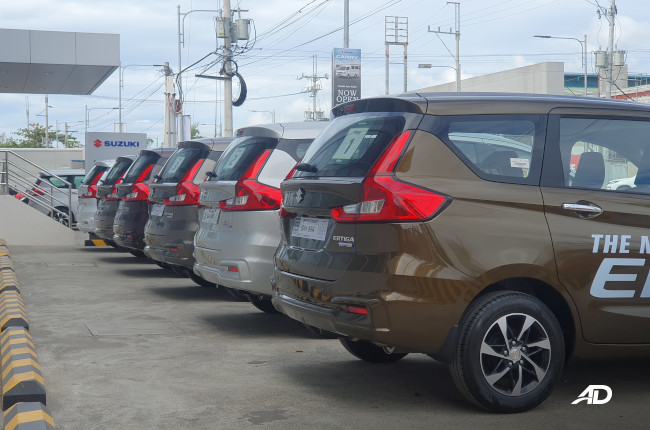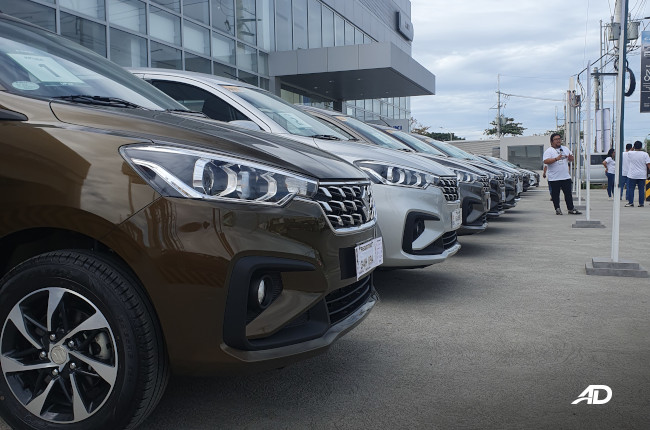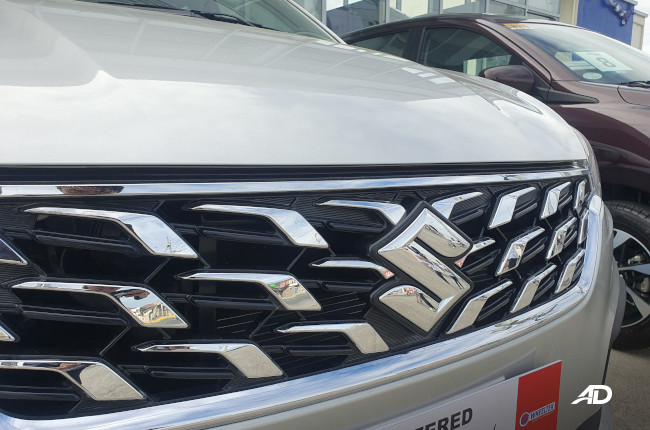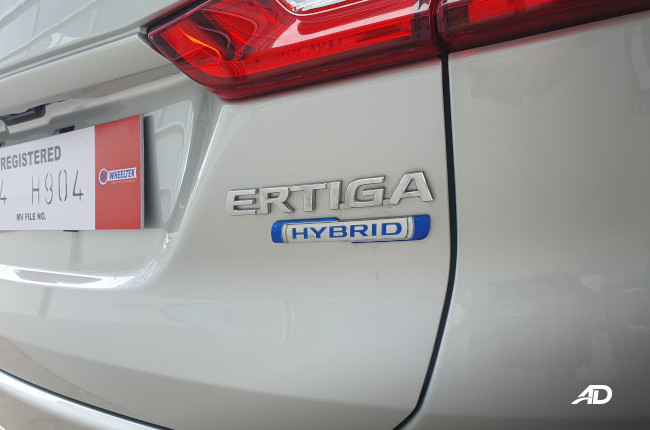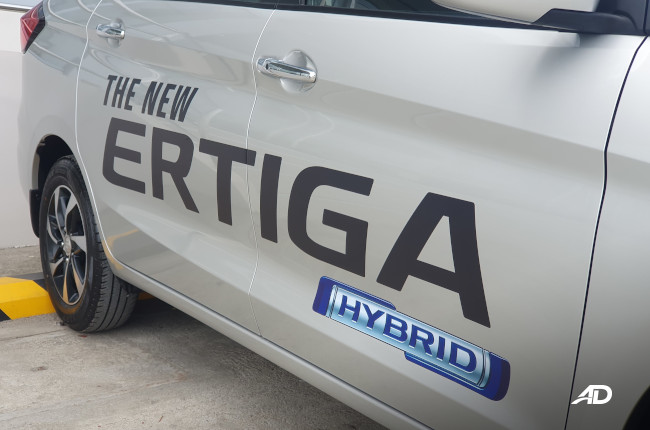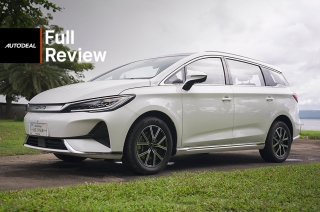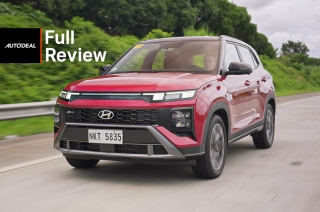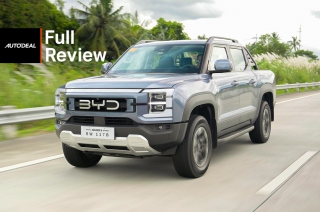
Perhaps one of the last cars that we expected to get a mild hybrid system is the Suzuki Ertiga. From a consumer’s perspective, the seven-seater is already frugal enough as it is, so putting a mild-hybrid system is just total icing on top of a fuel-efficient cake.
Suzuki did it anyway, took one of the most efficient MPVs on the market today, and gave it an assistive electric motor with a battery pack. On our first drive, we drove about 180 or so kilometers to Lotus Pod, Laguna Bay from Suzuki Auto Kawit, so we’ve got a good understanding of the model’s new hybrid system through city roads, highways, and provincial streets. So how does the new Ertiga Hybrid stack up? How much better is it compared to the standard Ertiga? Let’s dive in.
Same exterior, but with minor updates
You might not even be able to tell just by looking at the exterior that this car is packing a mild-hybrid system. Heck, even if you popped the hood, the engine looks like the standard 1.5-liter gasoline-only motor found in the regular Ertiga. So how will you be able to tell that it is a hybrid? Well, unless you want to have the decals on the side as we did, the only other way that you will be able to differentiate between the standard and the hybrid model is the badge at the back. Otherwise, there is a new grille and new wheels for the 2023 model year.
It’s still the same tried and tested design that we’ve come to like from Suzuki. Ever since its launch in 2019, the model has been selling quite well, which means that there are a lot of fans out there who like the look of this seven-seater. Still, we would have liked to see a little more creativity especially since hybrids are usually the top-spec trims available in the lineup. Still, if it means a lower cost and more people getting into mild hybrids, then it’s fine.
Same interior, but with some meaningful updates

Our sentiments carry over to the interior. It’s still the same as the current model, but with new faux wood trim and a new infotainment display. When we first got our hands on the Ertiga back in 2019, it had a basic infotainment system, even in the top-of-the-line variant. Now, we get the XL7’s Android Auto and Apple CarPlay-capable head unit along with a backup camera to boot.
Other than that, it’s still the same story. Seven seats, enough air conditioning vents for a comfortable ride, and a decent amount of space.
Mild hybrid

We know that some people are still conservative when it comes to hybrid cars. The worry that something might break down the line and be costly to repair is a very real concern among car buyers on the fence. Mild hybrids are the most entry-level hybrids of the bunch. That’s where the Ertiga sits. It’s not a parallel hybrid, which allows the user to use solely the electric motor alone, and it’s not like the Nissan Kicks which gets its battery power from the gasoline engine.

The Ertiga Hybrid is no true hybrid, but that doesn’t make it a bad car at all. In fact, the standard gasoline-only Ertiga was so efficient that you’d swear it was a hybrid, at least based on our experience. Now with an assist motor helping the car get up to speed and smoothing out the powerband, the driving experience has improved by quite a bit and the fuel economy isn’t too bad either.

On the drive with Suzuki Philippines, we were a part of a fleet of 10 Ertigas. While we didn’t achieve the highest fuel economy reading in the group (Suzuki computed the old-fashioned way), the range of figures was between 17 to 26 km/L with mixed city and highway driving plus traffic. The group that achieved 26 km/L also didn’t resort to turning off the air conditioning, they just turned on the car, plugged their phones into the infotainment system, turned on the air conditioning unit, and went on their merry way.
Following the test, on the way back we reset the clock and braced ourselves for more traffic. During this test, and driving all the way back to our original starting point, the Ertiga was still able to achieve 15.9 km/L. Traffic was heavier during the trip back, so a lower figure was expected, but by no means is that a “low figure.” Given the same conditions, we estimated that a normal Ertiga would have probably achieved a figure in the low 10s, perhaps around 12 to 13 km/L.
Other improvements made

Now, the hybrid system didn’t just give us stellar fuel economy figures, but it also felt better to drive. Getting up to speed still wasn’t fast by any means, but it was a smoother experience compared to the gasoline-only variant.
As such, the mild hybrid system serves more as an assist than anything else. However, shifts feel marginally smoother, perhaps thanks to the smoothness of the new powertrain, and acceleration, while not lively, feels easier. The model is still running a four-speed automatic transmission as well which is impressive.
A great way to get into hybrids
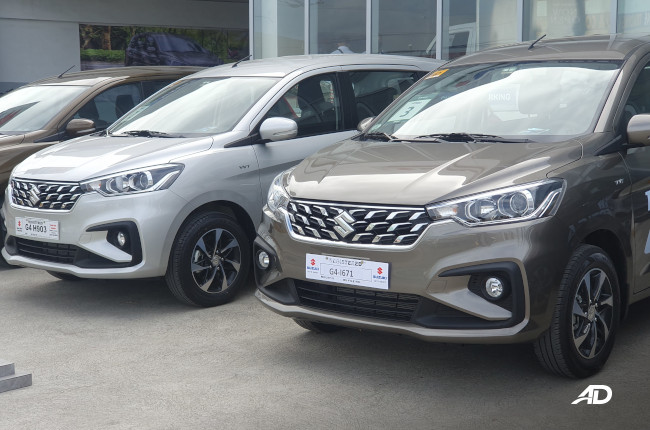
Sometimes, getting into hybrid models will mean paying an arm and a leg for that additional electric motor, however, the Ertiga’s price is set at just P1,153,000 for the top-of-the-line offering in the lineup. There is a less snazzy option pegged at P1,103,000, but for just a little more, the top-spec trim seems more worth it. Of course, if you want a more affordable manual version, then the Ertiga then becomes even more affordable at a starting price of just P954,000.
We have a few gripes, however. There is not too much difference in the way that the Ertiga looks. New wheels and a new grille only go so far, however, the tradeoff is that you get a mild-hybrid system, which is a good leap forward for Suzuki and its most popular model. Given that all Ertigas will now be mild hybrids, we’re happy to report that it’s a better model than ever before.
Specifications
Engine
1.5 LFuel Type
HybridPerformance
103 hp @ 6,000 rpmTransmission
Automatic-
Summary
-
Name Suzuki Ertiga GLX 1.5 AT Hybrid Body Type MPV Price ₱1,178,000 Transmission Category Automatic -
Engine
-
Engine Size 1.5 L Displacement 1,462 cc Number of Cylinders 4 Number of Valves 16 Transmission Type 4-Speed Automatic -
Performance
-
Drivetrain Front-Wheel Drive Max Output (hp) 103 hp @ 6,000 rpm Max Torque (nm) 138 Nm @ 4,400 rpm -
Economy & Environment
-
Fuel Type Hybrid Emissions Standard Euro 4 Fuel Capacity 45.0 L *Combined Fuel Consumption 19 km/L *Autodeal Review
-
Dimensions
-
Length 4,395 mm Width 1,735 mm Height 1,690 mm Wheelbase 2,740 mm Turning Circle 10 m Ground Clearance 180 mm Trunk Capacity 153 L Number of Doors 5 Number of Seats 7 -
Safety & Security
-
Driver's Airbag 1 Front Passenger's Airbag 1 Side Airbag Curtain Airbag Knee Airbag Auto Brake System Electronic Brake Distribution Anti-lock Brake System (ABS) with Electronic Brake Distribution
Immobilizer Security Alarm Stability Control Electronic Door Locks Speed Sensing Door Locks ISOFIX Lane Departure Warning System Blind-Spot Detection System -
Features
-
Cruise Control Front Parking Sensors Rear Parking Sensors Leather Upholstery Push Start Button Wheel Size 15 in Wheels Metal Type Alloy Airconditioning System Automatic Air Conditioning with Rear Manual Control Entertainment System 10" Infotainment Touchscreen Audio via 4 speakers Connectivity Smartphone linkage (Androids/IOS),Bluetooth, Aux and USB Navigation Ready Warranty 3 Years (100,000 km) Keyless Entry Roof Rack Sunroof Electric Adjustable Seats Power Steering Power Windows Power Outlet Steering Wheel Audio Control -
Technology
-
Active Park Assist Hill Start Assist AWD Modes n/a Tire Pressure Monitoring Heads-up Display Power Liftgate Start-stop System
Colors
Latest Review
-
2026 BYD eMAX 7 Review / Review
Can the BYD eMAX 7 prove that electric MPVs work in the Philippines? With 201 hp and 530 km of range, it just might.
4.3 / 5 -
2026 Hyundai Creta N-Line Review / Review
The Creta N-Line isn’t just a Creta with sporty looks; it’s got the performance and bite to back up its style.
4.3 / 5 -
2026 BYD Shark 6 DMO Review / Review
Can a hybrid pickup truck break the mold of what pickup trucks can be? The Shark 6 DMO has something to say about that.
4.6 / 5
Popular Articles
-
Electric Vehicles in the Philippines for under P1 million
Jerome Tresvalles · Aug 19, 2025
-
Top 3 Cars For Every Lifestyle—What Cars Are Right For You? | Behind a Desk
Caco Tirona · Apr 24, 2024
-
5 Tips to Maximize Fuel Efficiency
Jerome Tresvalles · Sep 09, 2024
-
Five driving habits that are draining your fuel tank
Jerome Tresvalles · Jun 24, 2025
-
Can engine braking harm your engine?
Jerome Tresvalles · Sep 11, 2025
-
Do electric cars even need maintenance?
Jerome Tresvalles · Oct 23, 2024
-
Best vehicles for an active outdoor lifestyle
Shaynah Miranda · Jul 25, 2024
-
How to drive different types of vehicle transmissions
May 23, 2024
-
5 easy ways to keep your car interior clean
Allysa Mae Zulueta · Nov 15, 2021
-
How to survive Metro Manila traffic
Earl Lee · Aug 16, 2022


